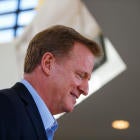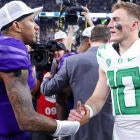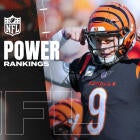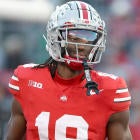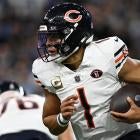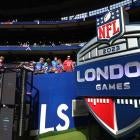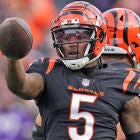Indications from Tuesday's meeting between NFL owners, players, executives and NFL Players Association personnel are that all sides identified "common issues" and engaged in "productive" conversation about how to "work together to promote positive social change and address inequality" in the wake of peaceful protests across professional sports.
The meeting, which came a day after reports that the NFL would formally endorse criminal justice legislation and finance a social activism boot camp, marked a "coming together," according to the league and NFLPA. NFL Network's Judy Battista suggested the dialogue Tuesday in New York was the "best communication [there] has ever been between players and owners."
And ESPN's Jim Trotter reported that NFL owners expressed "unconditional" support to work with players in addressing social issues, "meaning there was no demand by owners that players stop kneeling" in protest during pregame national anthems.
What the meeting also signified, according to Suzanne Nossel, executive director of PEN America, a New York City-based organization centered on defending free speech and persecuted journalists, was a rebuke of commentary on the situation by President Donald Trump.
"The overall thrust is the players and owners are working together, and they're not at odds," Nossel told CBSSports.com after Tuesday's meeting. "I read that as a rejection of the president trying to paint these protests as unpatriotic."
It's a sentiment echoed in a joint statement by the NFL and NFLPA, who said the "NFL community has a tremendous respect for our country, our flag, our anthem and our military" -- something Trump has repeatedly, both in public and in tweets directed at the league, accused the NFL and its protesting players of lacking.
Nossel, whose organization partnered with Rise and Resist to back the "Take a Knee" protests held outside Conrad Hotel, Tuesday's meeting location, said the cooperation between players and NFL owners further represents a stand against Trump's attempts to coerce league executives into prohibiting demonstrations during the anthem.
"We see a critical free expression right at stake here," she said. "The most serious problem is the role the president and the White House are playing in trying to get punishment exacted [on peacefully protesting players.] It's the president of the United States, so you can't say his comments are meaningless. When owners are making this decision about how to proceed with protests in the shadow of those threats, it takes on a different character and it has this weight of government intruding on what otherwise might be a corporate decision."
In other words, if most owners were like the Dallas Cowboys' Jerry Jones and had, on their own accord, essentially banned players from using the anthem as a platform for protesting social inequality, the NFL would have been well within its right to dictate a protest policy. (Most teams, for what it's worth, have done nothing of the like -- owners like Jeffrey Lurie have encouraged social activism through meetings with players and local law enforcement, countless players have reiterated they aren't protesting America or its military when demonstrating during the anthem, but rather using the time to call for reform, and the San Francisco 49ers' Jed York has equated Trump's demands to "petty attacks" that halt conversations about "racial and socioeconomic inequality.")
When the president himself attempts to impede upon owners' reaction to player protests, however, that's where Nossel and PEN America see a potential infringement.
"It can be legitimate for an employer to restrict free speech rights," Nossel said. "But there's been force from the White House, this badgering and hectoring of owners and players ... We see [them] trying to browbeat owners into preventing or punishing players for exercising their free speech right."
In the end, of course, the ultimate deterrent of any outside opinion -- even that of the president, who in September profanely called for NFL owners to "fire" players who knelt during the anthem -- will be continued cooperation between owners and players regarding the reform for which protests called. And from that end of things, the path forward "seems constructive," Nossel said, what with the league and NFLPA agreeing to "effectuate positive change" and "address inequality in our communities."
The NFL demonstrations essentially kicked off in 2016 when former San Francisco 49ers quarterback Colin Kaepernick started kneeling during anthems to raise awareness of police brutality. From there, varying protests spread across professional sports, especially after Trump's September condemnation, with players either kneeling, raising fists or linking arms during the anthem.













